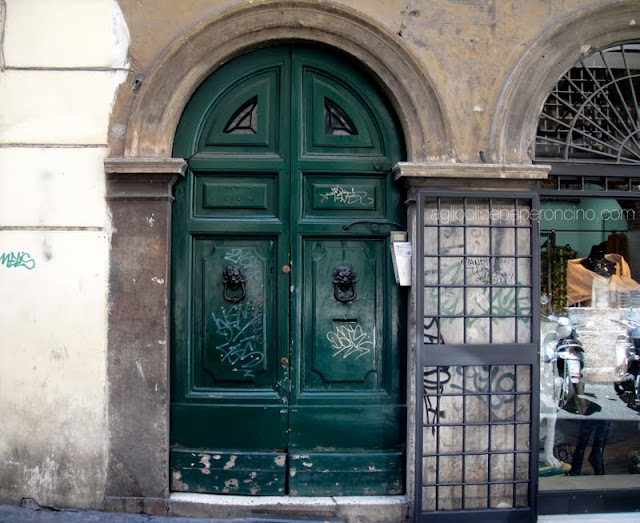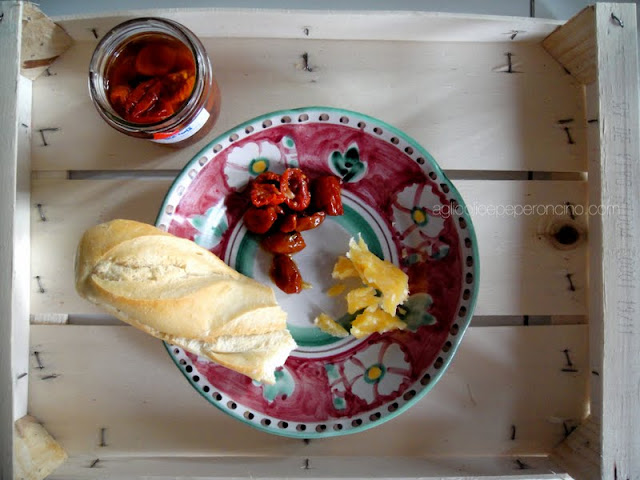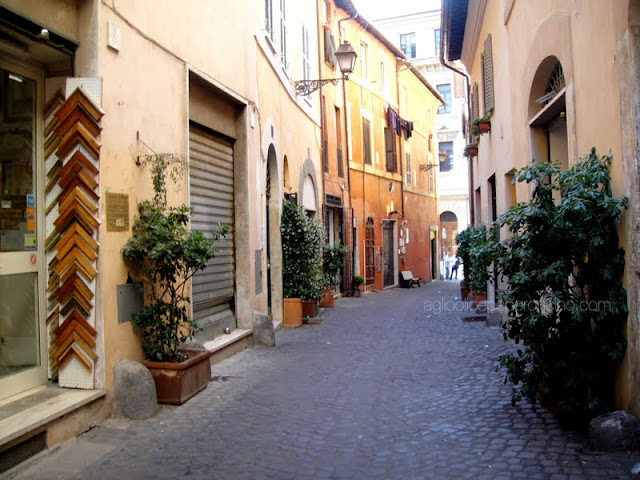Jun 29, 2011
Jun 22, 2011
Italian superstition

Yes I am a slave of it.
Italians are–for the most part–superstitious. Southern Italians are known for their irrational credulous way of life. Also theater people are hugely superstitious. My Italian side of the family is mostly southern Italian; the rest is from the north, and all theater people. This means I have very superstitious blood running through my veins.
I've grown up with certain rules and unspoken regulations to ward off bad luck, and was also raised performing rituals to draw in good fortune. These are very difficult to lose, and I have a feeling I will inevitably pass on my superstition to my son.
Late in her life, my Nonna Titta–whom I've spoken about in this post–when scolded by my mother for having imparted upon us way too many superstitions, confessed that she had disclosed only a fraction of the myths she knew, in fear that they might make life impossible for us. Imagine!
As I mentioned, theatrical superstitions flow richly in my ancestry; and it appears these know no borders. I'll quote an article from Wikipedia that fits the Italian theatrical standard to a T.
"Shakespeare's play Macbeth is said to be cursed, so actors avoid saying its name (the euphemism "The Scottish Play" is used instead). Actors also avoid even quoting the lines from Macbeth inside a theatre, particularly the Witches' incantations. Outside of a theatre the play can be spoken of openly. There are several possible origins for this superstition. One is that there is more swordplay in it than most other Shakespeare plays, and the more swordplay must be rehearsed and performed, the more chances there are for someone to get injured."
More common theatrical superstitions:
- No real money should be used on stage. In a similar vein, it is considered unlucky to wear real jewelry on stage, as opposed to costume jewelry.
- A bad dress rehearsal foretells a good opening night.
- Gifts of flowers should be given to actors after a show, as opposed to before.
- Peacock feathers should never be brought on stage, either as a costume element, prop, or part of a setpiece. Many veteran actors and directors tell stories of sets collapsing and other such events during performances with peacock feathers. This superstition in my family extends beyond the playhouse: no peacock feathers in the house.
- The color purple is unlucky. This is said to date to the time when during Lent, theaters would be draped in black and purple. During Lent, patrons hardly ever went to the theater, this meant debt. And often hunger.
- Instead of saying "break a leg," those who want to wish good luck to performers wish "merda" to them. Merda means 'shit,' and this wish is closely linked to the success of a play. When historically people would arrive by carriage, lots of people meant lots of carriages and horses, leaving behind piles of merda in front of the playhouse.
Here are some common superstizioni
GOOD LUCK:
- Seeing a spider at night: a sure sign of monetary income.
- Dropping things: someone is thinking of you.
- When your nose itches, it's either "pugni o baci," punches or kisses.
- Finding a button on the ground: a new friendship is on the horizon.
- Dreaming of someone dying: you've just added 10 years to their life.
- When a new moon appears, the minute you see it–doesn't matter if you're in the middle of the street, or in the company of strangers–there is a specific New Moon Incantation to be performed: "Benvenuta Luna che mi porti fortuna!" – Welcome, moon and may you bring me good fortune! This is to be repeated bowing respectfully at the lunar sliver 13 times with a coin in each hand.
BAD LUCK:
- Hanging paintings of birds in the house: feathers bring ailments.
- Killing a spider (see Good Luck item #1)
- Breaking a mirror: 7 years of bad luck.
- Bed should never face the door: replicates a coffin in a church.
- Giving a hankerchief as a gift: tears.
- Crossing silverware on the table: strife.
- Passing each other the salt hand to hand (without putting it down on the table): imminent fight between the two.
- Hat on the bed: recalls a scene of imminent, or just occurred death.
- Upside down loaf of bread on the table.
- Spilling olive oil.
- Spilling salt.
- Seeing nuns.
- Black cat crossing your path.
- Walking under a ladder.
- Crossing arms when shaking hands in a group.
- Crossing glasses when toasting in a group.
- Toasting with a glass of water.
- Owls.
- The number 17.
- 13 people sitting at the table.
SOUND ADVICE:
- Never trim toe and finger nails on Thursday.
- If you spill wine at the dinner table, wet your fingers and dab some behind every person's ear.
- Don't start a journey, new project or get married on a Friday or a Tuesday.
- Always look into the other person's eyes when toasting.
- Have your hair cut during the new moon.
- Never get a perm during your menstrual cycle.
- Eat plenty of lentils on New Years' Eve.
- Never sweep over the feet of an unmarried person, or they will never marry.
- If you give a gift of a new wallet, always put at least a coin in it.
- Always carry a corno portafortuna on you, wherever you go!
Jun 19, 2011
Merenda
Don't you just love to snack?
It's my favorite time of day.
Merenda is a fantastic word, it roughly translates to afternoon snack, or high tea in Britain–and as part of every Italian's childhood, it means Nutella sandwiches. But merenda is not just an afternoon affair, a very popular merenda is the middle of the morning one, which is usually savory.
Above is a very healthy (cough) merenda I treated myself to the other day. I switched off the computer, ignored the chirping phone alerts, and enjoyed a quiet moment with a crateful of sharply aged provolone, semi-dried tomatoes and the end of a baguette.
What's your favorite snack?
category:
cheese,
in between meals,
merenda,
snack,
sottolio
Jun 16, 2011
New freelance writing gig
«By experiencing a place with the help of a local, it's easier and more exciting to learn about the culture and habits of a community.»
Spotted by Locals is a series of blogs–and also downloadable city guides and iPhone apps–with updated tips by handpicked local bloggers in 33 European cities.
I contribute my insider local knowledge as the newest ROME Spotter on the team.
To read my latest articles on the Rome Spotted by Locals cityblog CLICK HERE
 |
I contribute my insider local knowledge as the newest ROME Spotter on the team.
To read my latest articles on the Rome Spotted by Locals cityblog CLICK HERE
Jun 11, 2011
Food tours in Rome
 |
| piadina+pastrami sandwich |
When I guide culinary tours, my clients often say, "You have the best job in the world."
I couldn't agree more.
I get to walk around one of the world's most beautiful historical and fascinating cities...
I like that Orazio, the fresh pasta guy, lets me take clients in the back of his shop to show how he makes tagliatelle casarecce. I love it when the workers at the bread baker see me walk in, they say, "Eccola!" – here she is, like they were expecting me. I like that if the group is in the mood, we can stop for a glass of wine at an enoteca. I'm happy there is no strict itinerary, and instead a fair amount of improvisation. Mostly, I like the smiles.
Jun 2, 2011
A walk in the Jewish quarter
One of my favorite parts of the city is the Jewish Quarter of Rome.
I always enter from here, off the Piazza Mattei, through...
...a narrow and cobblestone-paved side street called Via della Reginella.
Always stopping to glimpse at the Judaica on the corner...
...and landing at my sanctuary, Boccione–the neighborhood bakery.
It smells wonderful in here, all day long.
After some small talk with one of the signoras that work the counter, I walk out with a pocketful of almond-cinnamon biscottini, and a big smile on my face.
Are you familiar with this part of Rome?
I always enter from here, off the Piazza Mattei, through...
 |
| the Bernini–attributed turtle fountain |
...a narrow and cobblestone-paved side street called Via della Reginella.
...and landing at my sanctuary, Boccione–the neighborhood bakery.
It smells wonderful in here, all day long.
After some small talk with one of the signoras that work the counter, I walk out with a pocketful of almond-cinnamon biscottini, and a big smile on my face.
Are you familiar with this part of Rome?
Subscribe to:
Posts (Atom)
















